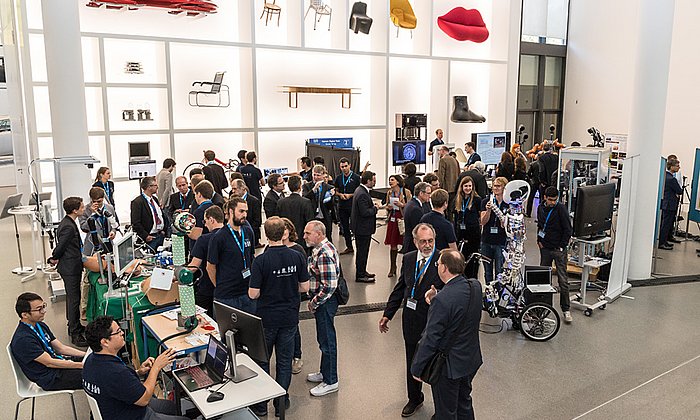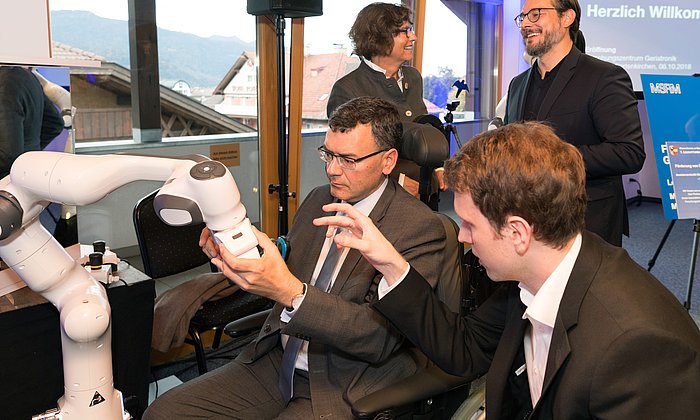Embodied AI in psychiatry: new technologies pose ethical questions
Robot therapists need rules

Robot dolls that teach autistic children to communicate better, computer-generated avatars that help patients cope with hallucinations, and virtual chats offering support with depression: Numerous initiatives using embodied AI for improving mental health already exist. These applications are referred to as embodied because they involve interactions between individuals and an artificial agent, resulting in entirely new dynamics.
The use of AI in psychotherapy is not new as such. Back in the 1960s, the first chatbots created the illusion of a psychotherapy session. In reality, however, this was little more than a gimmick. With today's advanced algorithms and higher computing power, much more is possible. “The algorithms behind these new applications have been trained with enormous data sets and can produce genuine therapeutic statements,” explains Alena Buyx, Professor of Ethics in Medicine and Health Technologies at TUM. With Dr. Amelia Fiske and Peter Henningsen, Professor of Psychosomatic Medicine and Psychotherapy, she has conducted the first systematic survey of embodied AI applications for mental health and drawn conclusions on the related opportunities and challenges.
Access to treatment for more people
The new applications have enormous potential. They can make treatment accessible to more people because they are not limited to specific times or locations. In addition, some patients find it easier to interact with AI than with a human being. But there are risks, too. “AI methods cannot and must not be used as a cheaper substitute for treatment by human doctors,“ says Amelia Fiske.
“Although embodied AI has arrived in the clinical world, there are still very few recommendations from medical associations on how to deal with this issue. Urgent action is needed, however, if the benefits of these technologies are to be exploited while avoiding disadvantages and ensuring that reasonable checks are in place. Young doctors should also be exposed to this topic while still at medical school," says Peter Henningsen, who is the dean of the TUM School of Medicine.
Ethical rules for artificial intelligence still lacking
At present, there are increased efforts to draw up guidelines for AI, including the Ethics Guidelines for Trustworthy AI just issued by the EU. However, Buyx, Fiske and Henningsen also see an urgent need to regulate the use of AI in specialized fields. “Therapeutic AI applications are medical products for which we need appropriate approval processes and ethical guidelines,“ says Alena Buyx. “For example, if the programs can recognize whether patients are having suicidal thoughts, then they must follow clear warning protocols, just like therapists do, in case of serious concerns.“
In addition, intensive study is needed into the social effects of embodied AI. “We have very little information on how we as human beings are affected by contact with therapeutic AI,” says Alena Buyx. “For example, through contact with a robot, a child with a disorder on the autism spectrum might only learn how to interact better with robots – but not with people.”
Fiske A, Henningsen P, Buyx A. Your robot therapist will see you now: Ethical implications of embodied artificial intelligence in psychiatry, psychology, and psychotherapy. Journal of Medical Internet Research (2019). DOI: 10.2196/13216.
Embodied artificial intelligence is also an important research area at the Munich School of Robotics and Machine Intelligence (MSRM). At this interdisciplinary center, Prof. Alena Buyx works with scientists from such fields as informatics, electrical and computer engineering and mechanical engineering as well as social sciences and humanities on research on such topics as the future of health, work and mobility.
High-Resolution image:
Technical University of Munich
Corporate Communications Center
- Paul Hellmich
- paul.hellmich@tum.de
- +49 89 289 22731
- presse@tum.de
- Teamwebsite
Contacts to this article:
Prof. Dr. med. Alena M. Buyx, M. A. phil., FRSA
Technical University of Munich
Chair of Ethics in Medicine and Health Technologies
Tel: +49 89 4140 4041
adina.von-malm@tum.de


